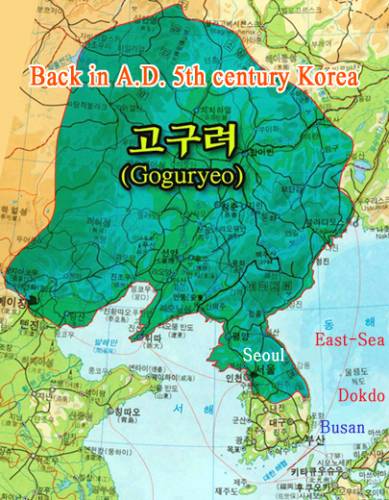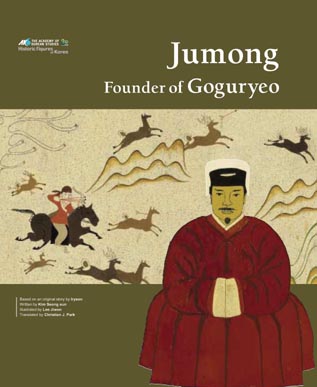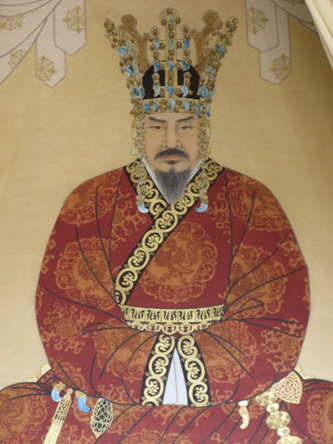
Gogureo map
GOGUREO
Competing Nationalisms:
The mobilisation of history and archaeology in the Korea-China wars over Koguryo/Gaogouli
By Yonson Ahn, The Japan Focus
Abstract: This article explores how and why history and archaeology have been mobilised and utilised in nationalist projects in East Asia, especially in the case of the Koguryo dispute between Korea and China. Koguryo (Korean)/Gaogouli (Chinese), an ancient kingdom in the period between 37 BC and AD 668, encompassed a vast area from central Manchuria to south of Seoul. According to the "Northeast Project”, launched in China in 2002, Gaogouli was an ethnic regime in an ancient Chinese province. In contrast, Korean historians of nationalist persuasion view Koguryo as an ancestral state of the Korean historical tradition and a foundation of the national identity. Unity, continuity and coherence are claimed in both communities through invoking the history and culture of Koguryo/Gaogouli. Koguryo/Gaogouli relics which were put on the UNESCO World Heritage List in 2004 are pivotal in the contestation between China and Korea. In both, the ancient relics are held to show the distinctiveness of a national past linked to the present. This article argues that the contested history of Koguryo/Gaogouli should be examined as a site of historical hybridity between China and Korea, rather than being claimed as a site of exclusive national history.
...For Koreans, the northern lands of Puyo (Korean)/Fuyu (Chinese), Koguryo and Parhae have been thought of as a spiritual motherland nourishing Korean culture (Byington 2004-c). Amongst the ancient kingdoms, Koguryo has always been treated as an ancestral state within the Korean historical tradition which both nurtures and unites people under one national identity, a feeling that has been particularly strong in North Korea. Thus, across the political spectrum in academia and NGOs, South Koreans have been unanimous in criticizing China’s claim to Koguryo’s historical heritage. This has been true in North Korea, as well. A shared Korean nationalism has facilitated North-South cooperation on the issue. Choe Kwang-sik (2004-b), a leading South Korean historian and protester in the Koguryo affair, points out that the Chinese remapping of history could result in reducing the span of Korean history to less than 2,000 years, thereby losing 700 years of a proud chapter of its history, losing a historical pillar of Korean identity, delimiting the size of Korea's territory to an area south of the Han River. A trans-historical "we” with timeless qualities is constructed in nationalist narratives. Yoe Ho-kyu (2004), another South Korean historian, asserts that "it is absolutely clear that the Goguryeo people are ancestors of the Korean people because Korea inherited Goguryeo culture in its entirety.” Koguryo history is thus mobilised to buttress the continuity of the Korean nation-state since the foundation of the nation by Tan’gun, roughly five millennia ago, through to the modern nation-state. The historically recovered ancient past has been powerful in defining contemporary Korean national identity. Thus, the Koguryo issue has led to an escalation in the debate over sites of "ethnic origins” and national continuity in Korea. The concerns over "damaging the origin of the Korean nation fatally” so that Korea becomes "a rootless nation” have been expressed in the media. This maintains the trope that "Our roots define us.”
Protests against claims to the Chineseness of Koguryo have been intense. In December 2003, activist groups in South Korea and overseas launched a public awareness campaign. South Korean civic activists held a series of rallies in protest against the Northeast Project and the Chinese government. The issue has become a frequent topic on TV and radio. A group of seventeen historical societies across South Korea took joint action against their Chinese counterparts in December 2003. The Society for Korean Ancient History issued a statement condemning China’s actions. Rallies have been held outside the Chinese embassy in Seoul. Scores of websites dedicated to the study of Koguryo have sprung up. Korean "netizens” protest and lay emphasis on "Korean spirit” by posting, for example, statements such as this: "as a small country, we have suffered countless hardships and humiliation at the hands of stronger nations, but the spirit of Korea can never be extinguished.” "The Spirit of Koguryo is in the hearts of 80 million Koreans,” reads a wide banner hung in Seoul during a demonstration in January 2004. It was referring to the populations of both North and South, as well as to Koreans living abroad. The Chinese claims to Koguryo have resulted in promoting cooperation between North and South Koreans and the Korean diaspora. The nation is inscribed as one surrounded by others who "steal” "our history and territory”. Collective needs to preserve the community’s irreplaceable historical values have been strongly addressed in the face of China’s nationalist projects.
Indeed, the two Koreas have competed to establish hegemony and legitimacy as heirs of the Korean nation since the partition in the postwar era. Koguryo antiquities and history embody special political significance in this competition. They denote the legitimacy of political authority and rule in North Korea. Koguryo is eulogised as an embodiment of the true national spirit and depicted as a champion of Koreanness against treacherous pro-foreign Silla in the North Korean official version of history ( Petrov 2004). Some North Korean archaeologists deny that "the Han Chinese ever conquered any part of the Korean peninsula.” (Pearson 1978, in Nelson 1995: 229) North Korean historians underline the "self-reliance, uniqueness and superiority of Goguryeo culture”. (Chin Ho-t’ae 1990) Accordingly, Chinese claims on Koguryo have been strongly denounced as "a pathetic attempt to manipulate history for its own interests” or "intentionally distorting historical facts through biased perspectives” in North Korean media...
 King Jumong
Koguryo-Related Books Published
Pyongyang, February 6 (KCNA) -- The Publishing House of Social Science of the Democratic People's Republic of Korea has published "Issues Related to Koguryo History" and "Castles of Koguryo", books on Koguryo which existed as a powerful state in the East for nearly a thousand years. The book "Issues Related to Koguryo History" has a prologue, an epilogue and eight chapters including "Building of Koguryo, World of Kings", "Course of Territorial Annexation and Integration by Koguryo", "Feudal Social, Political and Military Systems of Koguryo and Its Major Political Events" and "External Relationship, Independent Foreign Policy of Koguryo".
 King Muhyol
It deals with the territory, national power, relationship between Koguryo and neighboring countries, social system and other major issues related to Koguryo that had been distorted, fabricated and dwarfed by internal and external feudal historians and reptile historians of the Japanese imperialists and that have been clarified and corrected by the historical academy of Korea since the liberation of the country. The book "Castles of Koguryo" contains a prologue, an appendix and six chapters including "Distribution of Castles of Koguryo", "Castle Defense System of Koguryo", "Characteristics of Koguryo Castles" and "Influence of Castle Architecture of Koguryo Exerted on Surrounding Countries".
It says the prosperity of Koguryo was firmly guaranteed by the high degree of patriotism of the Koguryo people who regarded the national defence as the most sacred duty and by the castles that were the products of their distinguished creative power. Meanwhile, the publishing house brought out "Collection of Scientific Papers on Koguryo History" (two volumes).
THE KINGDOM OF THE WINDS

From: DramaCrazy.net:
The drama about the life of Jumong’s grandson, Moo Hyul, who later became Daemusin.
This drama is a remake of a comic by Kim Jin.
If you can find a better English synopsis...post it here...this show is a ghost...
KBS Global seems to be having problems...
CAST:
* Song Il Gook as Prince Moo Hyul / Daemusin
* Choi Jung Won as Princess Yeon
* Park Gun Hyung as Prince Do Jin
* Jung Jin Young as King Yuri
Extended Cast:
* Kim Hye Ri as Lady Mi Yoo (Yeo Jin's mother)
* Lee Jong Won as Prince Hae Myeong (Moo Hyul's brother)
* Oh Yoon Ah as Hye Ap
* Jang Tae Sung as Ma Ro (Moo Hyul's friend)
* Kim Jae Wook as Chu Bal So
* Kim Sang Ho as Ma Hwang
* Park Sang Wook as Gwi Yoo
* Im Jung Eun as Princess Se Ryu
* Park Jung Hak as Sa Goo
* Han Jin Hee as King Daeso
* Kim Byung Gi as Sang Ga
* Kim Gyu Chul as Myung Jin
* Kim Won Hyo as Gong Chan
* Kim Myung Soo as Goo Chu
* Jung Sung Mo as Bae Geuk
* Jung Da Bin as young Princess Se Ryu
| 









